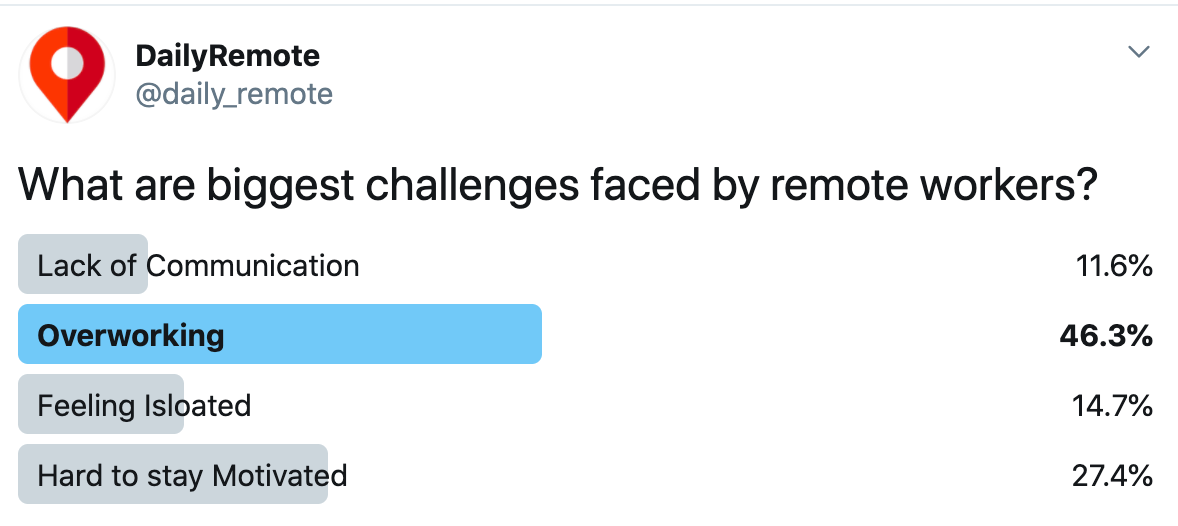Working remotely is the future of work. It includes no commute, no office politics, more quality time with family, and the flexibility of working from anywhere with higher productivity and extra time for a life outside of work.
But, working from home can also be challenging even in the best of circumstances. During these unfortunate times, there is added stress making it harder to stay motivated.
Whether you're thinking about working remotely or are currently a remote worker, we're making sure you remain productive and satisfied when you face such challenges head-on.

Overworking
Working long hours without knowing when to stop is one of the biggest challenges of working remotely. Add reminders in your schedule to get up, take walks, have lunch with family, and take breaks. Even schedule your start and end of the day to give your co-workers an idea of your workday. Use some Task Scheduler to set up reminders to manage your time correctly.
Create physical boundaries between you and your workspace to avoid the temptation to log back on and turn off all the notifications on your laptop to prevent work after hours. Send slack messages to your team about ending your day, and then actually shut down your computer. Timing your day with the Pomodoro technique can help as well.
The key is to find the perfect work-life balance by following a daily routine, including breaks, setting fixed work hours, and clear boundaries. Remote work can be intense, but you don't have to overwork.
Feeling Isolated
When working from home, it is common to feel isolated and left out compared to office going folks. Even above the cost and productivity benefits of working remotely, remote workers' mental health may take a toll.
Lack of networking and human interaction may damage the performance and productivity gains that one is receiving by telecommuting. Focus on striking the perfect balance between working remotely and socialising with people by following these tips:
Add social breaks in your schedule: Create a schedule representing fixed work hours and social breaks in it. Don't just plan outings but socialize with your family members and teammates. Decrease social information intake and increase time spent with other humans, especially your colleagues, friends, and family.
Spend an hour or two, meeting your friends, having lunch with your family, or even playing with your dog or kids. Go on outings, coffee dates, friends happy hours to lift your mood and keep your mental health in check.
Work at co-working or coffee spaces: Sign up for a co-working space or any coffee joints. These shared co-working areas have been on the rise, and many people feel happier and after joining. Keep your mental health in check to avoid burnout. Although, we would suggest working from home right now.

Join remote working communities & groups: We can't network in conferences and events right now due to the unfortunate times. But there are thousands of people working remotely, join remote work communities, and LinkedIn groups to interact with them.
Lack of Proper Communication
Effective communication is the most crucial ingredient to a team's success, whether it is a distributed team or an office-going team. Remote communication is mostly asynchronous compared to offices where one can directly go to a person's desk to have chit-chats. Remote working doesn't involve in-person chats.
When the bulk of your communication happens via email, it doesn't take much for bad blood to develop unless everyone is making their best effort to the contrary. - Jason Fried
Therefore collaboration becomes challenging and remote workers don't feel accountable and connected. It is necessary to understand the gaps that exist when communicating remotely.
One should clearly articulate their points when working from home, and thus, it is necessary to master the art of async communication. Communicate as much as possible, clarify misunderstandings, and be proactive in speaking up in team meetings.
Slack, Email or video chats are the significant source of communication for remote workers. Indulge in more meetings like 1:1s and team meetings, embrace video calls as a chance to connect with your colleagues. Since there are less in-person social interactions, such calls would also help alleviate feelings of isolation and anxiety.
Remote workers also need to be flexible when working with others in different time zones. Thus, use video conferencing tools such as Zoom, etc. to collaborate and discuss daily tasks with the team while avoiding zoom fatigue. Have fun team building activities in meetings and engage with the team members.

Distractions
There will be no co-workers dropping by your desk and other office interruptions such as birthdays and small talks when working remotely. But there are other distractions by pets, kids, spouse, home chores, or even deliveries.
Distractions might also include binge-watching Netflix or scrolling through social media lazily in bed instead of working. These distractions magnify when you are not following a daily schedule. Employ the following ways to trick your brain into focusing on the work in hand and avoiding distractions:
- Create a proper remote working schedule with scheduled breaks to avoid working the whole day and finishing the tasks in a fixed amount of hours.
- Dress up to avoid feeling unproductive and procrastinating while working from home. This will force your brain to get in the right work mindset.
- Dedicate a room to be your remote workspace, rather than settling the couch or bed; otherwise, it'll be hard to do anything meaningful work-wise.
- Put up a "do not disturb" sign on your door or when you put on your headphones. This would help your kids and spouse identify your deep working slots and save you during video calls.
- Set boundaries with your kids when working remotely. If you have small children, don't be afraid to look for resources or ask for help. Train your kids and spouse to be self-sufficient and occupy themselves.
Over snacking and no exercise
Unfortunately, overeating and lack of exercise can go hand in hand when you have a remote job. Since the kitchen and refrigerator are so nearby, it's easier to eat more junk food, be lazy, and waste the whole day unproductively. Staying healthy is not rocket science. Here are some ways in which to avoid over-snacking and start exercising;
- Add a slot for exercise, be it Yoga, Weightlifting, or Cardio, and do it. Meditating before bedtime is also advisable.
- Sitting for long periods is poison. Doctors recommend taking breaks frequently and going for a walk. Any physical activity can be beneficial to your overall health. Moreover, prefer a standing desk to avoid sitting at all.
- Have healthy meal preps done a day before to reduce the chances of unhealthily snacking or overeating. Be more mindful of your health habits. Have planned meals with definite proportions to maintain a healthy lifestyle.
- Feeling hungry, eat healthy snacks. Replace the junk with healthy foods that are low in calories and high in energy. Work smart, eat smart. Your body will thank you for it.

Difficulty to stay motivated
Working from home is even more challenging during these unfortunate times, with extra stress and added distractions. Being in pajamas and a comfortable couch all day doesn't motivate you to get started than a formal dress and an office setup.
Keep in mind that remote work is still work and that your boss or clients will have expectations that you need to meet. But that does not mean you have to be too hard on yourself; we're all doing our best under these unprecedented circumstances. A few simple strategies can help keep you motivated and on track.
- Create a straightforward daily routine with scheduled breaks. Stick to it to avoid distractions and get a structured day, which would increase your productivity.
- Work in a dedicated home office, equipped with your work desk, work laptop, and other remote work tools, only use that area for work-related activities to give it an office-like environment feel.
- Say no to distractions and avoid the social-media zone while working.
- Discipline is key to staying productive, hitting deadlines, and getting the most out working remotely. Create todo lists and set up clear deadlines using softwares like Trello boards or task manager to track task completion.
- Practice self-care, reward yourselves for completing tasks on time, exercise, eat healthily, and spend quality time with friends and family after work.
Conclusion
Despite the challenges above, remote work is gratifying. Be willing to cut yourself some slack if your productivity isn't on par. Remote work takes some effort, but it will be an enjoyable journey if you apply the correct strategies.
If you have been laid off or are looking for a remote job, we recommend looking at our job board. Looking for remote companies hiring right now? We've prepared a list of the top remote companies just for you. Finally, join like-minded people in our LinkedIn and Facebook community.

